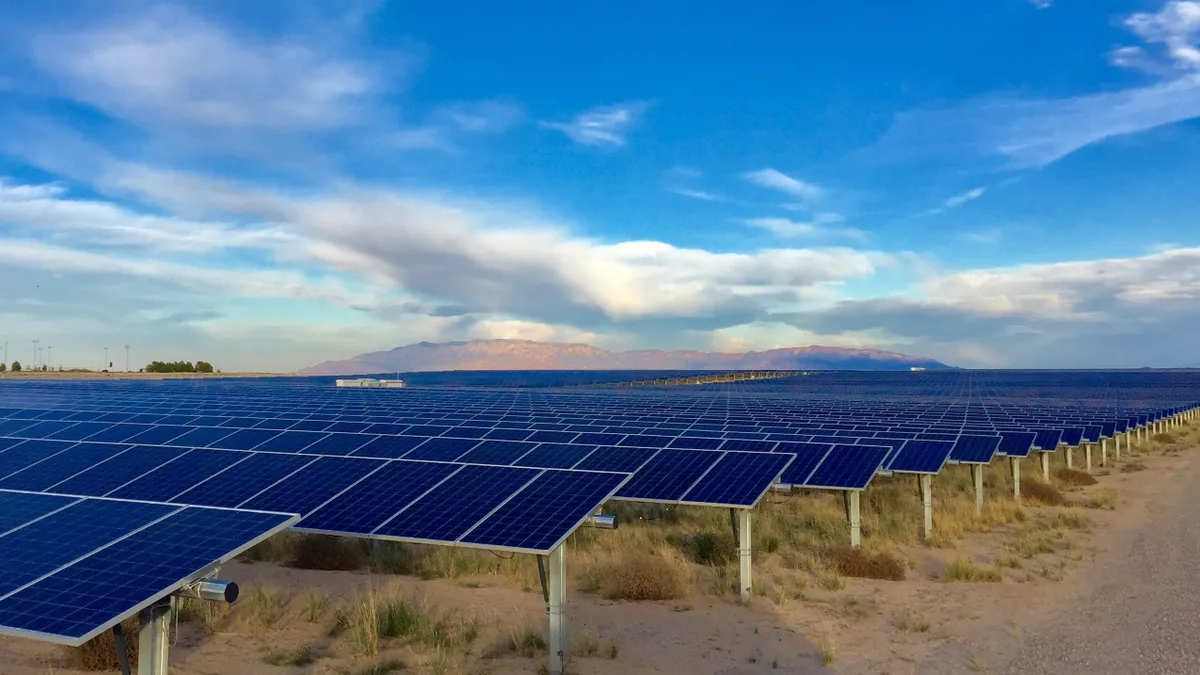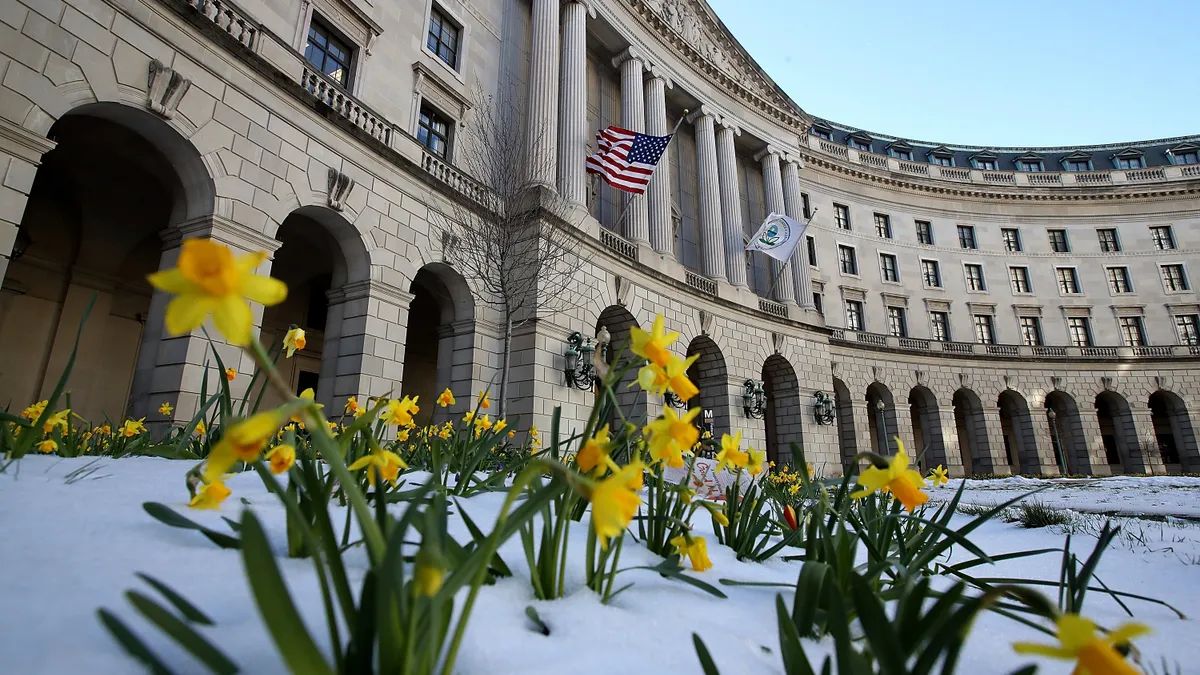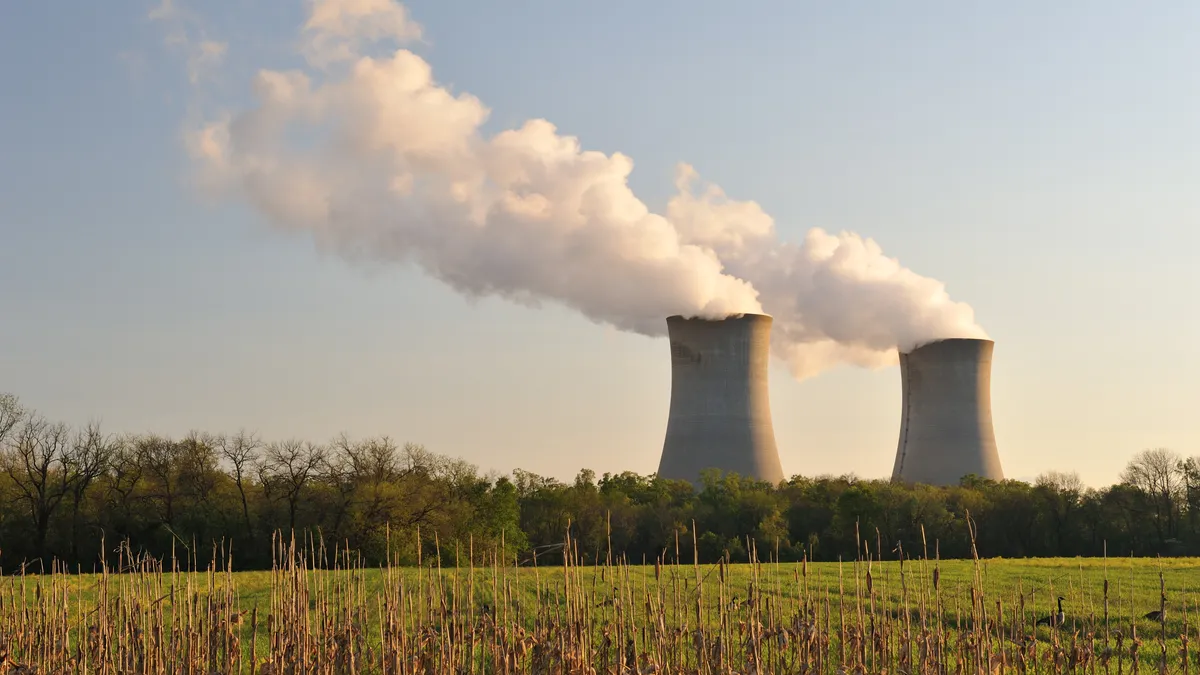Solar companies duked it out over a proposed tariff for imported solar panels in a marathon hearing at the U.S. International Trade Commission Tuesday.
The commission spent hours drilling witnesses on both sides of the debate, collecting evidence to see if two U.S. solar panel manufacturers have been injured by foreign competition and what, if anything, should be done about it. A decision on whether or not to proceed is a month away, but the commission's questions helped shed light on the rifts between domestic manufacturers and the rest of the U.S. solar industry.
The case? In April, a bankrupt U.S.-based solar manufacturer filed a petition with the ITC to impose a tariff and floor price on imported crystalline silicon photovoltaic solar panels.
The financially-embattled Suniva filed the petition days after it declared Chapter 11 bankruptcy. Fellow manufacturer SolarWorld Americas later joined the petition; its German-based parent company filed for insolvency earlier this year.
Both companies proposed a tariff of $0.40/watt and a floor price of $0.78/watt.
“This is not just about Suniva and Solarworld,” Matthew J. McConkey, a lawyer from Mayer Brown representing Suniva, said in his opening remarks. The U.S. market is “literally strewn with the carcasses of shuttered solar manufacturers.”
All of these arguments and filed briefs culminated into hundreds of solar workers descending on the District of Columbia Tuesday for what ended up as a 10-hour public hearing. Seven lawmakers and government officials and more than 40 solar stakeholders and industry experts testified on both sides. Seven embassy representatives also testified over the petition's impact on their trade deals with the U.S.
Anxiety hummed throughout the room as witnesses painted pessimistic visions for the future of U.S. solar. Roughly 88,000 jobs are at stake for solar installers and developers next year should the ITC side with the petitioners, according to the Solar Energy Industries Association (SEIA). Utility solar development — and to a lesser extent residential — could cede ground to other forms of energy, the association said. Solar accounted for nearly 40% of new capacity in 2016.
But Suniva and SolarWorld say the current market conditions imperil their ability to compete in a very crowded global space.
More broadly, the debate holds implications for the future of solar and American manufacturing under the Trump Administration. President Donald Trump vowed to prioritize American manufacturing jobs during his campaign, and this trade case opens the door for him to do just that.
Trump has decried solar as “too expensive.” His appointees in the Department of Energy and the U.S. Environmental Protection Agency openly pledged support to keep coal generation afloat despite a slew of retirement announcements and booming investment in renewable energy and natural gas.
A quick background
Within the last six years, Chinese manufacturers, heavily supported by the government, pumped out crystalline silicon photovoltaic modules, undercutting their global competitors. Nearly 30 companies fell victim to the glut of foreign competition, according to testimony from Suniva and SolarWorld during the hearing Tuesday.
SolarWorld petitioned the ITC for relief from the Chinese and Taiwanese imports in 2014. The ITC granted the petition, which was filed under its anti-dumping duty measure. Chinese imports fell slightly (10% in 2016) as a result, but not enough to save the companies.
Despite the relief, Suniva and SolarWorld struggled financially, incurring operating losses. In April 2017, Suniva filed for bankruptcy, and petitioned for a Section 201 import relief. Suniva officials wrote that rising imports took market share from American producers, and consequently led to bankruptcies, plant shutdowns, layoffs, and worsened the financial performance of the U.S. industry.
The petition says 1,200 U.S. manufacturing jobs have been lost and wages fell by 27% between 2012 and 2016. In the same timeframe, the U.S. market share fell from 21% to 11%, despite a $4 billion growth of the domestic market.
SolarWorld’s German parent company filed for insolvency shortly afterwards and joined Suniva’s quest. The companies testified in the ITC hearing that the petition had been planned well before their demise.
Suniva, headquartered in Georgia, always touted an “American First” ethos, despite using imported solar panels until 2015. An E&E News investigation uncovered the majority of its products were not, in fact, U.S.-based but came from other countries. And the company sold a 64% stake to Chinese firm Shunfeng in 2015.
In response, more than 25 solar installers, developers, economists, as well as local and state lawmakers who oppose the petition argued that imports were not the primary factor in the manufacturers’ fall.
Instead, poor business decisions, faulty equipment and failure to meet contractual agreements contributed to the troubled manufacturers’ collapse, they said.
“Imposing tariffs on importing modules is not the way to go,” said Rep. Jason Saine, a lawmaker from North Carolina’s House of Representatives. He testified against the petition, saying falling solar energy costs have spurred $9 billion in investment over the past decade. “ It’s about providing handouts to two companies who frankly don’t deserve it.”
Counsel for Suniva and SolarWorld angrily refuted claims of deficient business practices.
“Are we supposed to believe...these companies made bad business decisions while Malaysia, China and Korea were brilliant businessmen? Please.” scoffed Suniva counsel McConkey during his opening statement. “The only issue present today is injury to domestic manufacturing.”
So is domestic manufacturing the only issue on the table? Well, that’s complicated.
What exactly is ITC investigating?
Section 201 under the Trade Act of 1974 is essentially a safeguard measure for U.S. companies under serious threat from global competitors. The little-used clause is employed if an American industry could prove “serious” injury to its business from global businesses. Unlike the antidumping laws, companies do not need proof of unfair trade practices to invoke a Section 201 investigation.
The ITC’s investigation is narrowly confined to the impact on crystalline silicon photovoltaic solar panels. Other panel technologies, like thin film, are outside the scope. Domestic manufacturers, like First Solar who specializes in thin film cells, could benefit from these tariffs if those particular types of panels are out of the running.
The investigation is divided into two parts: the injury and the remedy phase. The first part, the injury investigation, is a fact-finding mission to collect evidence of injury to an industry. If the ITC finds that serious injury was inflicted, they can make a decision to proceed to the remedy phase.
The ITC would draft a remedy and send it over to the President. The President then makes a decision to implement the recommended remedy, change it or reject it altogether.
This is where it gets political and could endanger solar companies. If the investigation makes it to the remedy phase, it would open a door for President Trump to fulfill his campaign promises to U.S. manufacturers to put American manufacturing first and hurt the cost-effectiveness of solar energy.
Georga Public Service Commissioner Lauren “Bubba” MacDonald said as much during the Tuesday hearing.
If “the requested remedies are imposed, solar industry will come to a standstill,” MacDonald said, in turn depriving customers of a relatively cheap source of clean energy. “The sun is free; gas is a commodity,” he added.
A Section 201 investigation is rare, commissioners acknowledged. The last one was invoked in 2001 when President George W. Bush sought to protect the American steel industry. The European Union struck back with tariffs of their own, forcing the Bush administration to reverse course.
Now, 16 years later, Vice Chairman David S. Johanson wanted to know “what inspired Suniva and SolarWorld to revive the use of the dormant Section 201 global safeguard law?”
SolarWorld counsel Timothy Brightbill said, “Chinese producers were openly boasting how they could evade U.S. tariffs by shifting manufacturing bases to different countries." Both Suniva and SolarWorld said in pre-hearing briefs the swift relocation of manufacturing bases in Asia was a major factor in undercutting their business.
Where do the solar companies come in…
The proposed tariffs brought together an unlikely group of allies. SEIA roundly blasted the petition, saying it will endanger more than 260,000 existing jobs in the solar sector, as well as potentially 88,000 next year. However, those jobs are mostly confined to installers and developers, instead of the manufacturing base.
Partnering up with SEIA, however, is the conservative think tank Heritage Foundation and the American Legislative Exchange Council (ALEC). The groups have usually condemned the solar industry for its generous use of federal and state incentives. But now both conservative organizations say the proposed tariffs would stifle free-market principles and undercut competition.
A GTM Research report estimated those tariffs could endanger two-thirds of utility-scale solar expected to come online in the next five years alone. Utility-scale solar developments compose roughly 80% of the U.S. solar market. And module costs make up between 20-50% of total installation costs.
If the tariffs are imposed, module costs would go up and boost the cost of projects, thus endangering future utility and residential solar projects. As a result, utilities could turn to wind or even natural gas sources for their energy needs.
“Utilities have to plan for long term, cost shifts in solar, and things like this...this is a big issue for them,” and hurts solar projects in the pipeline, said Frank Maisano, a founding member of Policy Resolution Group at Bracewell.
The long road ahead
It’s hard to say where the ITC leans after a 10-hour hearing with few breaks. Both sides are confident they presented the better argument. But there is still a sense of trepidation over the future of solar if the ITC decides there is enough evidence to proceed to the next step.
And while solar companies, along with SEIA, urged the commission to think of the impact on the downstream and upstream supply chain, they conceded that consideration eventually rests with President Trump.
Suniva and SolarWorld, meanwhile, stoutly warned foreign competition could eliminate U.S. competition if the ITC declines to intervene.
But SEIA and other industry representatives said tariffs would do longer-lasting damage to the supply chain and future job growth.
“We’re in an industry here where we are competing against other forms of energy. We finally got there. We’re there and as a result demand boomed,” said Matthew Nicely, a lawyer with Hughes Hubbard who represented SEIA.
The ITC will make a decision on whether or not to proceed to the next step by Sept. 22.




















